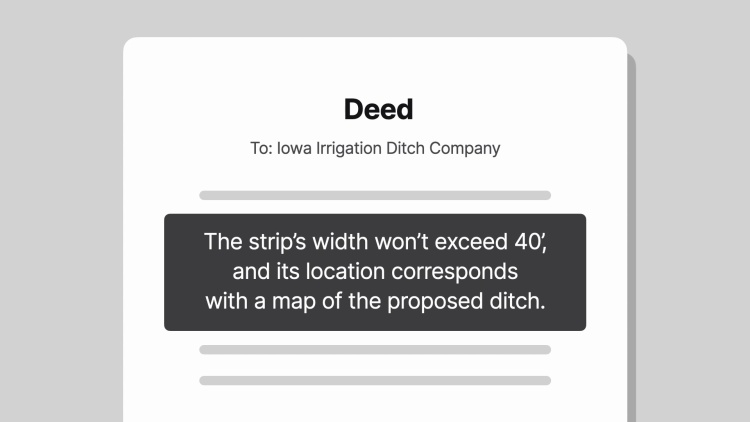Northwest Realty Co. v. Jacobs
South Dakota Supreme Court
273 N.W.2d 141 (1978)
- Written by John Yi, JD
Facts
The Iowa Irrigation Ditch Company (IIDC) obtained quitclaim deeds along the course of a proposed irrigation ditch. Some of the deeds granted unconditional fee title while others granted easements with “reverter to grantor” clauses. In 1898, Jacob Smith delivered to IIDC a deed that would “grant, remise, release and quitclaim . . . all his estate, right, title, interest, and claim” to a strip of land adjoining the proposed ditch. It further recited that as further consideration “of this right of way” that IDC would provide water at the regular established price as soon as the irrigation ditch was in operation. To identify the strip, the deed referred to a recorded plat, which indicated a single line. IDC stock was issued to the owners of each tract of land irrigated from the ditch. Ted and Olive Jacobs (defendants) are successors to one of these landowners. In 1973, IDC shareholders voted to dissolve the corporation and deliver quitclaim deeds to the owners of the land adjacent to the ditch, lands which were subject to easements for the ditch. The ditch itself was destroyed in a flood. IDC then conveyed a portion of “the real property owned by the corporation” to Kenneth Shabina, who conveyed it to Northwest Realty Company (plaintiff). Jacobs later filled a portion of the ditch to use as a parking lot. Northwest, claiming it had fee title to the ditch, sued for an injunction to compel Jacobs to remove the fill from the ditch. Jacobs appealed the trial court’s decision.
Rule of Law
Issue
Holding and Reasoning (Zastrow, J.)
What to do next…
Here's why 908,000 law students have relied on our case briefs:
- Written by law professors and practitioners, not other law students. 47,100 briefs, keyed to 997 casebooks. Top-notch customer support.
- The right amount of information, includes the facts, issues, rule of law, holding and reasoning, and any concurrences and dissents.
- Access in your classes, works on your mobile and tablet. Massive library of related video lessons and high quality multiple-choice questions.
- Easy to use, uniform format for every case brief. Written in plain English, not in legalese. Our briefs summarize and simplify; they don’t just repeat the court’s language.





